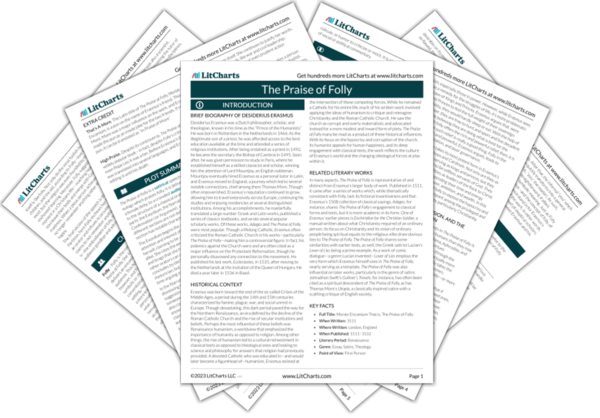Satire Quotes in The Praise of Folly
But aside from the fact that I refrain throughout from using names, I have in addition tempered my style that the judicious reader will easily perceive that my end is pleasure rather than censure.
In general, they allow this much to folly, that many times what cannot be refuted by arguments can be parried by laughter. But you may think that exciting laughter by witty remarks, and this by a set method, does not belong to Folly.
If a prince really laid his own life alongside these symbols, I believe he would have the grace to be ashamed of his finery. He would be afraid some nosy satirist might turn the whole spectacle, suited as it is for high tragedy, into laughter and derision.
Were wisdom to descend upon them, how it would inconvenience them! Wisdom, did I say? Nay, even a grain of salt would do it–a grain of that salt which is spoken of by Christ. It would lose them all that wealth and honor, all those possessions, triumphal progresses, offices, dispensations, tributes, and indulgences; it would lose them so many horses, mules, and retainers; so many pleasures.
To work miracles is primitive and old-fashioned, hardly suited it our times; to instruct the people is irksome; to interpret the Holy Scripture is pedantry; to pray is otiose; to shed tears is distressing and womanish; to live in poverty is sordid; to be beaten in war is dishonorable and less than worthy of one who will hardly admit kings, however great, to kiss his foot, and finally, to die is unpleasant, to die on the cross a disgrace.
And although war is so cruel a business that it befits beasts and not men, so frantic that poets feign it is sent with evil purpose by the Furies, so pestilential that it brings with it a general blight upon morals, so iniquitous that is usually conducted by the worst bandits, so impious that it has no accord with Christ, yet our popes, neglecting all their other concerns, make it their only task.
And yet through a cloud, or as in a dream, they know one thing, that they were happiest while they were out of their wits. So they are sorry to come to themselves again and would prefer, of all good things, nothing but to be mad always with this madness. And this is a tiny little taste of that future happiness.












